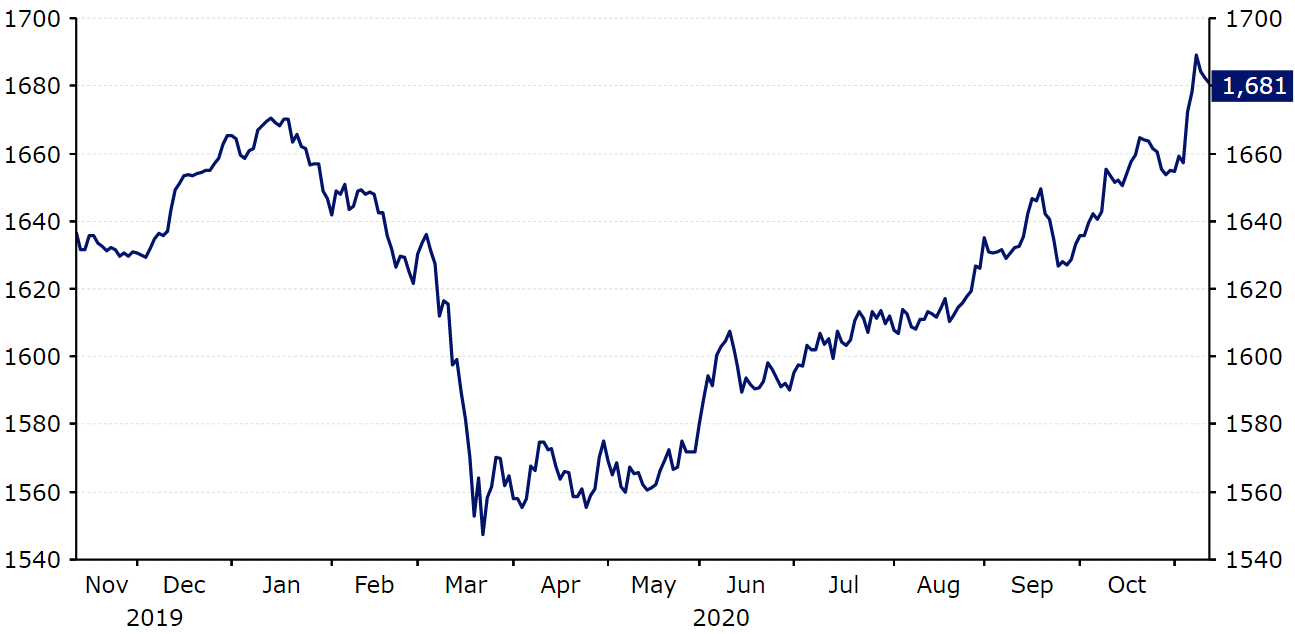US 2020 Presidential Election Reaction - Biden wins election, what’s next?
Joe Biden has won this year’s US presidential election, but how has the currency market reacted and what does his victory mean for US policy?
FX Market Updates
Joe Biden has won this year’s US presidential election, but how has the currency market reacted and what does his victory mean for US policy?Biden’s path to victory was not quite as clear as national and state opinion polls had suggested. Prior to the election, the poll of polls had the Democratic candidate around 7 points clear in the popular vote. His actual margin will end up at around half of that. Biden’s delayed, razor-thin win in the key swing state of Pennsylvania was, however, enough to push him over the 270 electoral votes required, nearly four full days after the polls closed.Figure 1: US 2020 Presidential Election Results Map (as of 16/11/20) Source: Ebury/BBC Date: 16/11/2020
Source: Ebury/BBC Date: 16/11/2020 Source: Refinitiv Date: 13/11/2020Emerging market currencies have also rallied, with notable moves higher in the Mexican peso and Chinese yuan, two of the countries thought most likely to suffer from a continuation of Trump’s protectionist policies. The MSCI emerging market currency index is currently trading approximately 1.5% higher for the month and is now around its strongest position since May 2018 (Figure 3). Emerging market currencies were given a further leg up by last Monday’s positive news regarding progress towards a COVID-19 vaccine. Figure 3: MSCI EM Currency Index (November ‘19 - November ‘20)
Source: Refinitiv Date: 13/11/2020Emerging market currencies have also rallied, with notable moves higher in the Mexican peso and Chinese yuan, two of the countries thought most likely to suffer from a continuation of Trump’s protectionist policies. The MSCI emerging market currency index is currently trading approximately 1.5% higher for the month and is now around its strongest position since May 2018 (Figure 3). Emerging market currencies were given a further leg up by last Monday’s positive news regarding progress towards a COVID-19 vaccine. Figure 3: MSCI EM Currency Index (November ‘19 - November ‘20) Source: Refinitiv Datastream Date: 13/11/2020
Source: Refinitiv Datastream Date: 13/11/2020
 Source: Ebury/BBC Date: 16/11/2020
Source: Ebury/BBC Date: 16/11/2020How have financial markets reacted to Biden’s win?
Markets had a case of deja vu on the night of the election, as early results showed that Trump had once again outperformed the opinion polls - as was the case at the 2016 election. The safe-haven US dollar initially strengthened on the prospect of a close race after President Trump won in a handful of battleground states, notably Florida, Texas, Ohio and Iowa. Bookmaker odds had Trump as clear favourite at one stage overnight on Wednesday - as high as 80% during the early hours local time. It became increasingly clear, however, that Biden was heading for victory even with a handful of states still to declare. An added complication relative to previous elections was the high influx of postal voting brought about by the COVID-19 pandemic. Approximately 100 million Americans are said to have voted by mail this year of the record 160 million or so that voted overall - considerably higher than the 20% that did so four years ago. A feature of these ballots is that the majority of mail-in votes were cast by Democrats, with Republicans far more likely to have attended the polls in person. Financial markets, therefore, began pricing in a Biden victory relatively early on Wednesday morning, even when the official results showed a near dead heat in many of the key swing states and news outlets were cautious in declaring a winner. As it became apparent that Biden was on course to win, investors began ditching the safe-haven dollar and favouring risky assets. The main EUR/USD pair rallied by over 2% in the few days following election night, briefly rising back above the 1.19 level earlier this week (Figure 2). Higher risk major currencies have also been buoyed, notably the Australian and New Zealand dollars and the Norwegian krone, with the safe-haven Japanese yen and Swiss franc the two worst performers over the post-election period.As we mentioned in our election preview report, a Biden presidency is perceived as a positive for risk assets, given the higher likelihood of a larger fiscal stimulus programme under the Democrats and decreased trade uncertainty.Figure 2: EUR/USD (November 2020) Source: Refinitiv Date: 13/11/2020Emerging market currencies have also rallied, with notable moves higher in the Mexican peso and Chinese yuan, two of the countries thought most likely to suffer from a continuation of Trump’s protectionist policies. The MSCI emerging market currency index is currently trading approximately 1.5% higher for the month and is now around its strongest position since May 2018 (Figure 3). Emerging market currencies were given a further leg up by last Monday’s positive news regarding progress towards a COVID-19 vaccine. Figure 3: MSCI EM Currency Index (November ‘19 - November ‘20)
Source: Refinitiv Date: 13/11/2020Emerging market currencies have also rallied, with notable moves higher in the Mexican peso and Chinese yuan, two of the countries thought most likely to suffer from a continuation of Trump’s protectionist policies. The MSCI emerging market currency index is currently trading approximately 1.5% higher for the month and is now around its strongest position since May 2018 (Figure 3). Emerging market currencies were given a further leg up by last Monday’s positive news regarding progress towards a COVID-19 vaccine. Figure 3: MSCI EM Currency Index (November ‘19 - November ‘20) Source: Refinitiv Datastream Date: 13/11/2020
Source: Refinitiv Datastream Date: 13/11/2020




